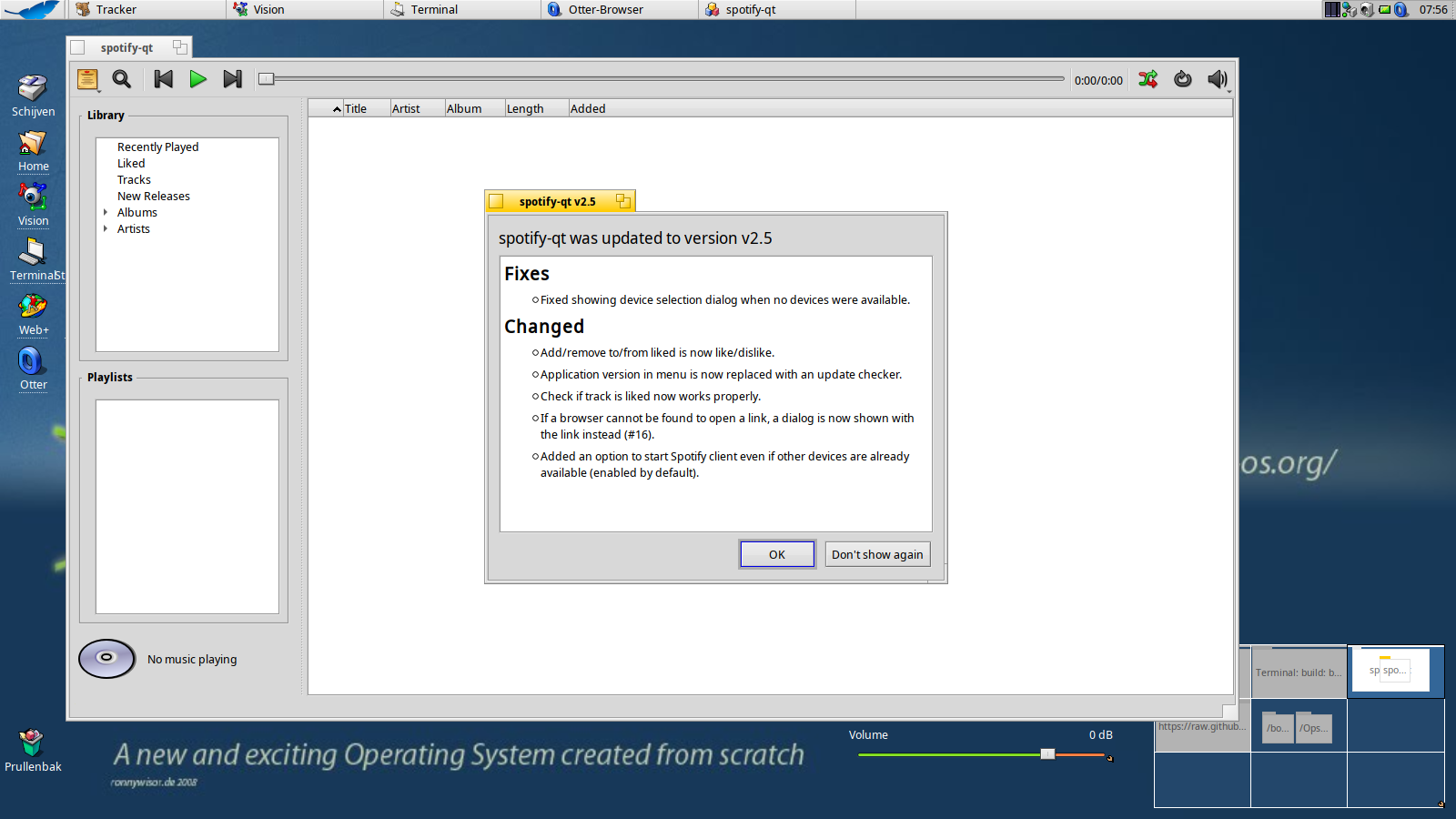If you have something merged into the master tree we could do a source checkout and see if it fixes things before a next release? PS, Thanks for looking into this!!!
A fix has now been pushed to master, please try it out and see if the issue is resolved.
Seems to have fixed the issue, thanks @kraxarn!

So it isn’t clear to me, does this actually play anything without spotifyd?
That I don’t know, haven’t checked that one out (as I don’t have any playlist as you can see), I could see if a build for spotifyd could be build, maybe @kraxarn could shed a light on this?
Merged a 2.5~git recipe that (at the moment is building on the buildbots) should be available in a bit
So, the new version works. Updated from HaikuDepot. I do usually have playlists and I do have premium, but no playlists shows up.
Trying to search gives nothing. Playing/pausing (empty) claims "Failed to play/pause playback. Missing permissions.
Other than that, the application starts and works 
Thanks for replying @mikehaiku! Probably needs spotifyd then also, will have to look into that (or anyone who has some time to look into this) 
I’m stuck on the Authenticate part, it doesn’t get past after entering ID details. Any ideas?
Currently, it can’t play music on its own, though, any playback client works, not only spotifyd. I could look into it, as there’s no real playback client on haiku afaik, but the official playback API relies on widevine, which I assume doesn’t work properly under haiku. I think the main problem with trying to use spotifyd is that the underlying audio API used by haiku isn’t supported by any rust library. I’m not sure if it uses alsa or pulseaudio, but if it does, there shouldn’t be any issues. I’ll take a look.
@mikehaiku
Never seen any missing permissions error before, other than for users without premium. Seems something went wrong during authentication. Maybe try logging out and back in again?
@bitigchi
Do you mean that nothing happens when you press authenticate? If that’s the case, it seems like it can’t find a browser to open. A dialog should be shown with the link, but if it doesn’t, check the terminal output for the link.
Hello @kraxarn
I have deleted config files and reauthenticated. Still no playlist and issues persist.
Edit by me:
I should note that the spotify dashboard sees that an app has accessed it through client id/secret.
Second edit:
I should note that it also fails to set repeat and random, says it doesn’t have permission.
Packaging issue perhaps with wrong permission bits set?
But does it actually produces any audio output?
@mikehaiku
No files outside of the main binary are used, so I don’t think file permissions are an issue. You could try compiling it from source instead to see if it helps. The error probably comes from an API response, if it’s shown in the application.
@extrowerk
Not currently, as it doesn’t make sense when targeting Linux, but it probably makes more sense for it to when targeting haiku.
Permissions correct, playlists show up, newest hpkg version. Thanks!
Edit:
I also want to say that even though it has no spotifyd, I am able to see my networked receivers and my phone and able to control the music from spotify-qt, even though there is no “native” playback on Haiku.
Thanks, I didn’t realize it could also remote control other devices - it now works fine for me also. 
I also had the permission error at first, my mistake was that I had not pasted the complete URL from the authentication dialog into Otter.
Anyone tried to build and run spotidyd. We have an up2date port of RUST dont we?
Haven’t checked there, occupied with other things atm, so if anyone could have a go at it 
We dont have support for the audio backends that are required. I wonder why no one ported “Port Audio” to Haiku. Seems to be cross plattform lib in C/C++.
There is a recipe for portaudio, but not sure if it’s functional … https://github.com/haikuports/haikuports/tree/master/media-libs/portaudio
It’s not. Porting it is one thing, but you still need to actually get it to send the data to the media kit. It’s “cross platform” in the sense that it has a different implementation for each platform.
So you could only enjoy PortAudio writing the data to a WAV file currently, and not getting it to your soundcard.